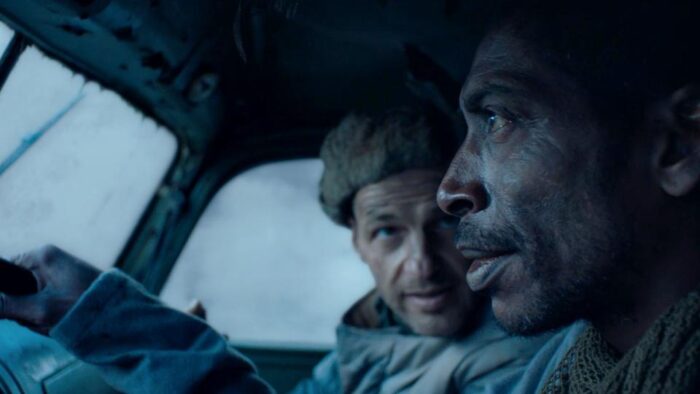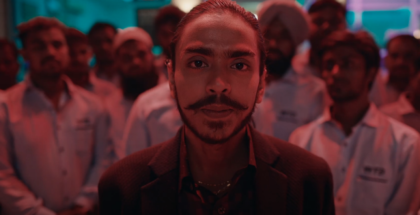VOD film review: Undergods
Review Overview
Direction
8Score
9Unease
8Laurence Boyce | On 23, May 2021
Director: Chino Moya
Cast: Johann Myers, Géza Röhrig, Ned Dennehy
Certificate: 15
Undergods, the debut film from Spanish-born filmmaker Chino Moya, is a dark and often disturbing anthology of fables that often defy easy categorisation. It perhaps provides a fitting metaphor for the creeping sense of unease and disconnection that seems to be prevalent throughout much of the modern world.
Beginning in a run-down and seemingly abandoned industrial city – all empty factories and disused warehouses – two corpse collectors (Johann Myers and Géza Röhrig) roam the streets, collect their wares (little caring if the merchandise is dead) and swap dark tales.
One story follows a couple (Michael Gould and Hayley Carmichael) who live in a block of flats. When a stranger (Ned Dennehy) knocks on the door, claiming that’s he’s been locked out of his place, they accommodate him. But soon he begins to insinuate himself into their lives, as he slowly pushes the husband out of the picture. As it reaches its grim conclusion, two side characters help us segue into a new story of a businessman who steals the blueprints of an inventor who soon retaliates in kind. This tale wends us back to the corpse collectors from the beginning of the story before we finish with the dour flourish of a story of a family whose lives are disturbed by the mute appearance of a face from the past.
Everything here is designed to keep the audience slightly on edge and off-kilter. Set in an indeterminate time (all the stories have some flashes of modernity) and in a myriad of locations (from mundane flats to the wasteland of the beginning), the film is constantly playing with notions of reality and naturalism. Moya utilises every dystopian cliché in the book, bringing in a myriad of influences that include Kafka, The Twilight Zone, Amicus horror anthologies, the works of Ridley Scott (whose production company receives a credit) and the tropes of British social realism. But he configures them into something new and darkly affecting.
Indeed, Moya proves himself adept at creating a tangible atmosphere, with the film swathed in muted colours of grey and blue as he presents to us a cold and unforgiving world with equally cold and unforgiving protagonists. Special mention must also be made of the wonderful and sparse synth score from Wojciech Golczewski, which harks back to post-apocalyptic sci-fi of the 70s and 80s.
There’s little levity on offer here (although there’s an amusing little vignette near the conclusion that takes a swipe at notions of self-help) and there’s a constant sense of disquiet and isolation, partly driven by the fact that many of the stories eschew rational explanations or neat conclusions. The world here is messy and unknowable, with redemption or happiness very far away. With the protagonists of the majority of the stories being middle-aged, white and male there’s a sense of an old world slipping out of control, of a society desperately trying to cling to old certainties and ways of being. But this leads to decay and stagnation and the urban alienation and desolation that is prevalent throughout Undergods.
Those looking for bright escapism or coherent storylines will be disappointed. But those prepared to immerse themselves in a world of bleak fairy tales that defies genre and an atmosphere that can be as darkly exhilarating as it is uneasy will find that Moya has delivered in spades with a debut that promises a lot from the director in future years.



















